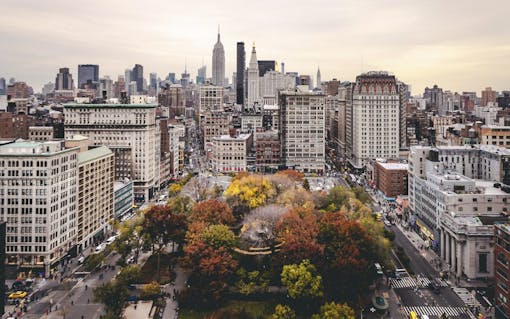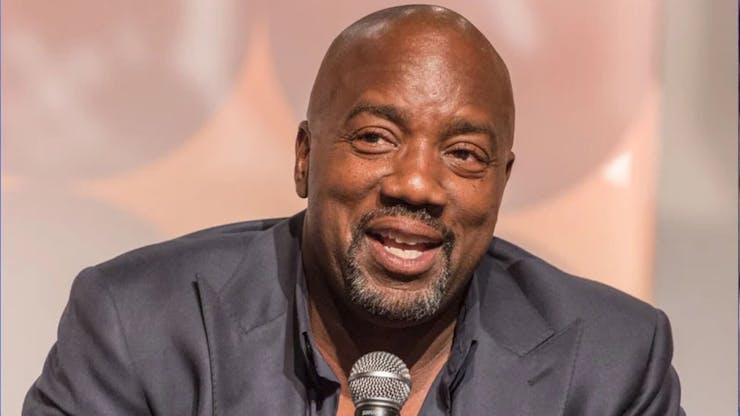The former New York Undercover detective shares his lifelong love for the plant with Leafly as the Empire State prepares to legalize.
In the 1990s, Malik Yoba starred as detective J.C. Williams in the hit Fox drama New York Undercover. He also played a role as a Jamaican bobsledder in the classic comedy Cool Runnings. Since then, Yoba has kept busy writing and acting on hit shows like Empire and Girlfriends, while ramping up to participate in New York’s highly-anticipated legal cannabis market.
Leafly caught up with the veteran performer in New Orleans at the Black CannaConference, where he shared his feelings on how legal weed will impact his hometown of New York City. Yoba also spoke about his plans to de-stigmatize cannabis on the big screen and behind the scenes using his decades of media and real estate experience.
Catching up with Malik Yoba in New Orleans
When I met up with Malik in late 2021, he was a featured speaker at the Black CannaConference in New Orleans. He told me that this was just his second ever canna-conference, adding that he felt “like a student.”
Thanks to his years of experience in film and television, Yoba has considerable expertise and talents to bring to the budding field of legal cannabis. While speaking on a panel at the conference, Yoba revealed plans to enter the weed industry. “I’ve always been into cannabis,” he told me in a one-on-one meeting after his panel. “I’ve known about cannabis all my life. Certainly, since I was a kid.”
The first time Yoba consumed cannabis was in middle school. “I was 12 or 13,” he remembers. “It was always about relaxation. But I don’t know if people even realized that’s what they were doing it for.”
“It was also about being an artist,” he adds. “It’s a tradition you hear about. My father was a jazz musician. He smoked weed. His friends did. It was just around. I didn’t start thinking about it for medicinal purposes until more recently. As I mentioned from the stage, now I use it for pain management and also for sleep.”

With legal weed on the horizon in his home state, the Bronx native still laughs recalling how much stress once came with the plant.
“I did try to sell once in high school,” he remembers. “This dude that was dealing in the street in Washington Square Park, he dropped his whole bag. It was like bush weed with a bunch of seeds and sticks. I took it, but I was too scared to sell it.”
On the opportunities he sees for NYC’s legal cannabis market
New York will soon be home to one of the world’s largest legal weed markets. And Yoba is optimistic about his ability to help expand the industry. He wants to de-stigmatize the plant on the screen, and behind the scenes, by opening career opportunities in cannabis.
“(We) see the writing on the wall, man,” he tells me as we discuss the possibilities of legal pot in Gotham City. “There’s just too much money. New York is the financial capital of the country. So I’m excited to be a part of it. Especially from the real estate side.”
The cannabis industry has already created a massive amount of jobs (see our Jobs Report) and tax dollars in states that have legalized. But New York’s commercial and cultural influence is different. And Yoba believes green could bring a new golden era to his city.
“What I’m appreciating about what’s happening is that people are thinking about business in a different way. People are saying, ‘I don’t have to just do one thing.’” His passion boils over when speaking on the abundance of ancillary opportunities available in the legal cannabis industry.
“It’s good to see that people want to do more than just get a dispensary. There’s the legal aspect. There’s the marketing aspect. There’s the media aspect… There’s the growers, the distribution, the construction… There’s a whole ecosystem.”
– Malik Yoba on the wide range of opportunities in New York’s legal cannabis industry
Selling pickaxes in a gold rush has been a proven business strategy for centuries. And Yoba intends to use his real estate and media skills to lead others into the bountiful field of legal weed he sees clearly ahead once the plant can be legally exchanged.
“(People are) sharing information. They’re saying, ‘I don’t just have to do one thing.'” He continues, “Because most peoples’ point of entry has been the flower itself, they forget about all that other stuff.”

On New York’s approach to social equity
“We haven’t really been invited to the party at the same level,” Yoba says of Black and Brown inclusion in other legal states. But so far, he is happy with New York’s Office of Cannabis and its approach to maximizing access and social equity in the industry.
“What I’m hearing from the state are all the efforts that are being made to make sure that there is greater equity and inclusion. Specifically, the hundreds of licenses set aside for individuals who did time.”
Yoba feels a deep responsibility to give back to the communities that sacrificed to make the current industry possible.
“For most of us (in the cannabis industry), it’s mission work. People aren’t just going to the job to do the job, they’re like, ‘I’m gonna meet my expectations and make my money. But I’m making sure that I’m bringing our folks along.'”
Barriers to entry like real estate and access to capital have lead to legal oligopolies in states like Florida, where less than 20 licensed retailers serve over. But New York’s Office of Cannabis Management and residents like Yoba are intent on not letting a similar scenario play out on their watch.
“I care about the freedom of our people,” Yoba told me at Black CannaConference. “We have to know that certain things are possible.”
On his potential for influencing NYC’s legal weed industry
Yoba doesn’t intend to be a taker in this budding field. He wants to contribute his wide range of talents (both in media and as a property developer) to help the whole industry grow.
In the next five years, he intends to “help a lot of people [get in the door] and wants to be a leader on the ground floor of building America’s next great industry. “We heard about prohibition back in the ’20’s,” he says. “They knew it was only a matter of time.”

That’s why he’s already working to secure a couple locations in the city for legal cannabis enterprises. And he’s confident in the will of the state and the people for NYC to be just as big as California within the next decade.
Yoba says he’s privy to the plans for the state’s first 150 dispensary locations. And he has faith that the Office of Cannabis Management and new Governor Kathy Hochul will be able to avoid the road bumps other states have run into since legalizing.
Fulfilling the dream of a greener New York
Yoba, like many New York residents, had a hard time envisioning how the legal weed industry would play out at first.
Some residents are growing less optimistic, as medical and recreational shoppers patiently await the legal market’s sluggish rollout. But Yoba is seeing firsthand that it takes time to build out a successful market anywhere– let alone a state that’s home to the financial capital of the world.
“Now I get to see it from the business side.There are people who have been positioning themselves that I know for years, over a decade in some cases to be successful in this space.” And the more I’ve started paying attention to friends nudging me towards this space.” So far, he’s in on CBD beverage company with a childhood friend.
“Once it became legal in New York, I said, ‘Let me take a close look.’ And then I jumped in with both feet recently… I have a piece in a company called So Cloud Water, a CBD beverage,” he told me, before adding, “There are already major beverage companies trying to get into that side of the industry.”

Ultimately, Yoba wants to impact this wide-open field on as many levels as he can. “I think these stories are important, not just from a documentary standpoint, but fiction as well.” He says he has “a couple of film ideas (and) series ideas” related to cannabis that will remove the stigmas that still linger around the plant.
His plan is to attack the stigmas “from all levels. So at a certain point, it becomes ubiquitous everywhere you look. And it’s not this weird thing anymore.”





